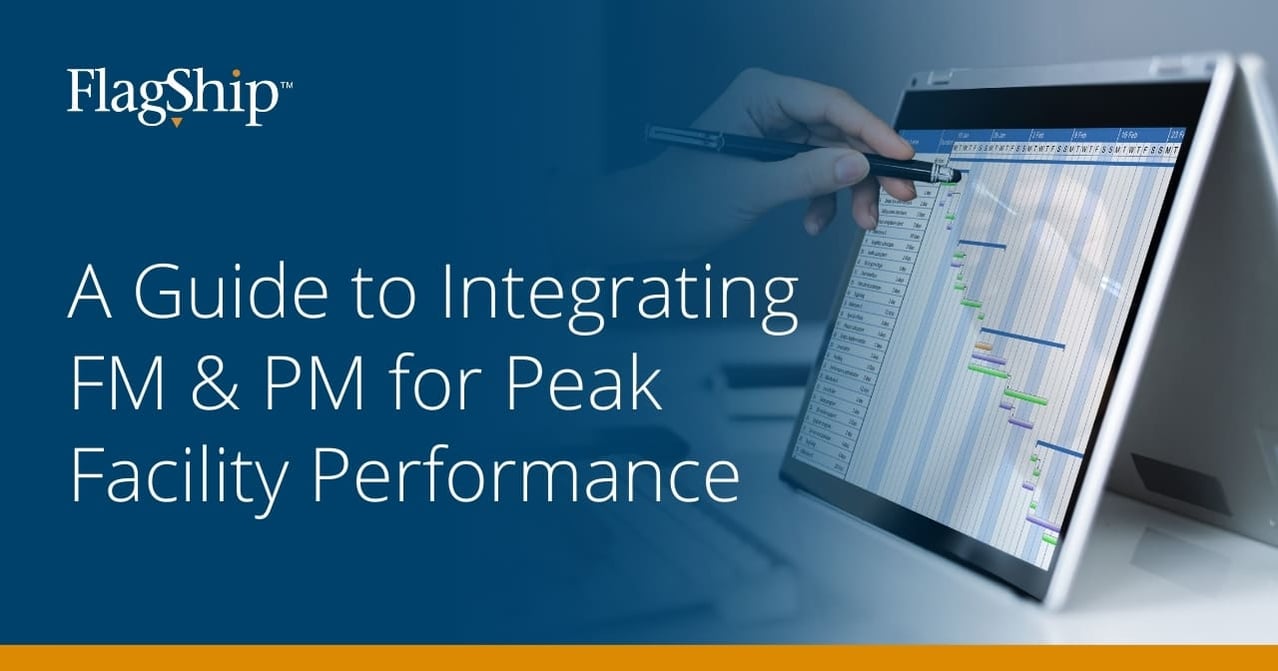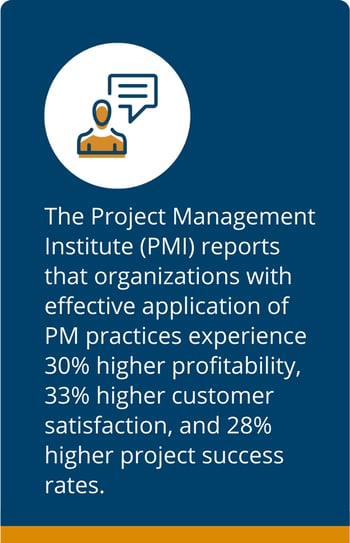
Facilities management plays a crucial role in the performance of your business – from maintaining a comfortable working environment to controlling operational costs.
However, even the most comprehensive facilities management strategy can encounter situations that require a more focused approach. This is where project management comes into play.
Integrating project management within your facilities management framework allows you to tackle specific initiatives, such as renovations, technology upgrades, and relocations, with greater efficiency and precision.
This blog post will delve into the benefits of an integrated approach, exploring how it can help you achieve your facilities goals and contribute to your organization's success.
In this episode of Flagship Features, Bruce Field, VP of Project Management, outlines the benefits of merging project management with facilities maintenance.
FM & PM: a Symbiotic Relationship
While both play distinct roles, facilities management (FM) and project management (PM) work hand-in-hand to optimize your facilities and drive business success. Let's consider their core functions and how they complement each other.
Facilities Management
FM focuses on the maintenance, operation, and continuous optimization of your physical space. It encompasses a wide range of activities, including:
- Maintaining building systems
- Managing space and assets
- Promoting safety and compliance
- Controlling operational costs
Project Management
PM is needed to execute specific, time-bound initiatives within the facility. Some common PM undertakings in facilities management include:
- Large-scale renovations, expansions, or reconfigurations
- Implementing new technologies or systems
- Responding to compliance or regulatory changes
- Launching sustainability initiatives
- Planning and executing emergency preparedness and recovery plans
Ultimately, FM provides the foundation and knowledge base for PM. The data collected and experience gained through FM activities informs planning, resource allocation, and risk assessment for PM initiatives. For example, FM data on space utilization patterns may empower PM teams to optimize space during a renovation.
PM, in turn, delivers targeted improvements and innovation within the FM framework. By successfully implementing projects like technology upgrades, PM helps FM maintain and optimize the facility more effectively. For instance, upgrading to a smart building system empowers FM with real-time data and automated controls, improving operational efficiency and resource management.
 This synergy between FM and PM ensures that your facilities are not just well-maintained but also constantly evolving to meet your organization's needs. By embracing an integrated approach, you can unlock a new level of performance and create a space that truly supports your business growth.
This synergy between FM and PM ensures that your facilities are not just well-maintained but also constantly evolving to meet your organization's needs. By embracing an integrated approach, you can unlock a new level of performance and create a space that truly supports your business growth.
In a powerful demonstration of this synergy, Flagship recently managed an important construction project for a longtime client, leveraging our FM expertise to enhance PM outcomes. Not only did we identify the most efficient ways to execute the project, but we also anticipated potential challenges to deliver a state-of-the-art data center ahead of schedule and with minimal operational disruption.
When You Need PM Support
If you work for a small organization that occupies a single facility, your existing FM framework might be sufficient for handling routine maintenance activities. However, as your business grows and infrastructure needs become more complex, integrating PM into your FM program becomes increasingly valuable. This allows the core facilities team to continue focusing on their daily tasks while dedicated project managers tackle large-scale initiatives.
Feeling overwhelmed by an FM project? This checklist can help you determine whether you need the expertise of a project manager.
- The project has a defined scope, timeline, and budget: PM thrives on clear parameters. If your initiative has well-defined goals, deadlines, and resource limitations, it's a prime candidate for PM.
- The project requires specialized skills or expertise beyond the existing FM team’s capabilities: If the project demands specific technical knowledge or experience not readily available within your FM team, consider bringing in a project manager with the necessary expertise.
- The project has the potential to disrupt ongoing facility operations: PM helps minimize disruptions to your daily operations by ensuring clear communication, task delegation, and contingency planning.
- Stakeholder engagement and communication are critical to the project's success: Project managers excel at managing stakeholder expectations, keeping everyone informed, and fostering collaboration throughout the project lifecycle.
- The project involves managing risks and dependencies: PM methodologies are adept at identifying and mitigating potential risks as well as managing dependencies between various tasks and resources.
By understanding when to leverage PM alongside FM, you can ensure that initiatives are completed efficiently, effectively, and with minimal disruption to your day-to-day operations.
Practical Steps for Integrating PM
 The beauty of an integrated approach lies in its flexibility. Whether you manage your facilities in-house or outsource your FM services, you can still harness the benefits of PM.
The beauty of an integrated approach lies in its flexibility. Whether you manage your facilities in-house or outsource your FM services, you can still harness the benefits of PM.
For in-house teams
- Establish a collaborative culture: Encourage communication between FM and PM teams, fostering information sharing and regular updates to ensure everyone's aligned on project goals and potential impacts on daily operations.
- Invest in training: Equip your FM team with basic PM skills like time management and risk identification. This empowers them to support PM initiatives within their regular duties.
For outsourced FM
- Look for integrated service providers: Some companies, including Flagship, offer both FM and PM services under one roof. This simplifies communication and streamlines project execution.
- Clearly define roles and responsibilities: Establish a clear understanding of responsibilities between your internal team and the FM provider's FM and PM teams. This avoids confusion and fosters accountability.
Regardless of which path you choose, remember to leverage technology platforms that facilitate communication, task management, and data sharing. This ensures transparency and improves project tracking and reporting, ultimately leading to a successful and efficient facilities program.
Specializing in both FM and PM, Flagship delivers the benefits of an integrated approach – including increased efficiency, improved cost management, adaptability, and quality assurance.
Our experienced FM team seamlessly manages your day-to-day operations, while our dedicated project managers act as an extension of your team to ensure the on-time and on-budget delivery of even your most complex projects.
This integrated approach results in an enhanced FM strategy, leading to improved outcomes for your organization.
If you're interested in learning more about Flagship's offerings, visit our services page here.





Leave a Comment